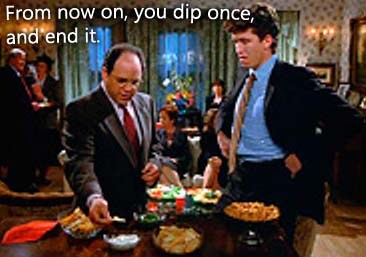Don’t sit so close to the television, you’ll go blind. You have to wait an hour after eating before going swimming. There are tons of health claims that have been thrown at me my whole life, and I’ve never stopped to ask whether or not there was any truth to them. Is the five-second rule even true? Or are we just eating dirty food off the floor?
Gross. So I stopped and wondered. Was grandma right, or have we been lied to all along. Here’s a look.
Double dipping a chip
 The rule, as advocated by “Timmy” on a classic Seinfeld episode, is that dipping a chip, biting it, and then dipping that same chip again is like “putting your whole mouth right in the bowl”.
The rule, as advocated by “Timmy” on a classic Seinfeld episode, is that dipping a chip, biting it, and then dipping that same chip again is like “putting your whole mouth right in the bowl”.
Is it true? You gotta give it to Timmy. A study published in the Journal of Food Safety found that bacteria in the dip significantly increases due to saliva transfer that occurs during double dipping. Gross. They don’t mention the possible loophole of biting a chip, but then turning it around so that you re-dip using the unbitten portion.
The five-second rule
So you know the rule, right? If you drop a piece of food on the floor, you can still snatch it up and safely eat it as long as it has been down for fewer than five seconds. Dirt and bacteria won’t have had time to infiltrate the food.
Is it true? Nope. Luckily, the folks at CNN recently conducted an experiment on this. Their experts tested various foods dropped on the floor and found that “the amount of bacteria transferred … didn’t depend much on how long the food was in contact with the contaminated surface — whether for a few seconds or for a whole minute. The overall amount of bacteria on the surface mattered more…” So if you drop a cookie on a clean, freshly scrubbed floor, you’re probably okay. But if you drop it by the urinal in a sports bar, there’s no speed in the laws of physics fast enough to pick it up and have it still be okay to eat.
It’s dangerous to wake a sleepwalker.
You’ve heard this one, right? If you wake a sleepwalker while they’re wandering it can be harmful to the sleeper by putting them in shock or causing brain damage or injury.
Is it true? Nope. They’ll just be confused and wondering where they are and what time it is. Otherwise, they’ll be fine.
You can’t drink milk when you have a cold.
It increases mucous and will make your congestion, breathing, and sniffling worse
Is it true? Actually, there’s no connection between consuming dairy and mucous production. Go ahead and soothe your sore throat with a hot chocolate.
An apple a day keeps the doctor away
Those who know me will know that I do in fact eat apples every day. Some days that is all I eat. Do they really have magical healing properties that prevent you from getting sick (hence keeping the doctor away)?
Is it true? Nope. Not really. People who eat fresh fruit of any kind on a daily basis tend to be healthier than those who don’t. Apples are a good choice because they are readily available, inexpensive and highly portable. (Strawberries are healthy, but you can’t carry them in your pocket.) So while no food has magical healing properties, eating a variety of fresh fruits and vegetables sort of is a good way to ‘keep the doctor away.’ We’ll call this one a draw.
Eating carrots lets you see in the dark
The story is that if you eat plenty of carrots, your eyesight will improve so dramatically that you will be able to actually see in the dark. While, I’ve heard that story my whole life, I’m not sure how many people actually believe it. But I found the story behind it interesting.
Is it true? No, it was a deliberate lie. Carrots actually do contain vitamin A which makes them good for your overall eyesight. But they can’t give you night vision. That story was a deliberate propaganda misinformation campaign launched by the British in World War II. The Allies did not want the Germans to know that they had the radar technology to spot bombers on night raids, so they put out press releases boasting of how the English pilots were eating large amounts of carrots so that they could see in the dark. The legend was born, and the story stuck with us.
Don’t go swimming for an hour after eating
 Of course, right? Because if you jump in the pool too soon after eating lunch you’ll get a bad cramp, your muscles will seize up, and you’ll sink like a stone. Everybody know this.
Of course, right? Because if you jump in the pool too soon after eating lunch you’ll get a bad cramp, your muscles will seize up, and you’ll sink like a stone. Everybody know this.
But is it true? The theory is that he digestive process will divert the circulation of the blood toward the gut and away from the muscles required for swimming and that can lead to drowning. The fact is there has never (ever) been a documented case of someone drowning because they went swimming on a full stomach. Any high-intensity exercise after a large meal can leave you feeling cramped or nauseous, but if that happens in the water, just get out.
Bonus:
If you swallow gum, it doesn’t stay in your stomach for seven years. It comes out in your poop.
Can you catch a cold from going out on a chilly day with wet hair? Nope. The cold is a virus. You can only catch it from being exposed to the virus, not environmental conditions.
Drinking coffee doesn’t dehydrate you. While caffeine itself can act as a diuretic, the amount of water in coffee exceeds this. Plus, regular coffee drinkers develop a tolerance for the diuretic affects. A recent study found that “coffee, when consumed in moderation by caffeine habituated males provides similar hydrating qualities to water.”
The jury is still out (as evidenced by heated discussion at family gatherings) over how far back to sit from the TV for safest viewing.
Oh, and vaccines don’t cause autism.
We also recently found out that eating white bread can be just as healthy for you as whole wheat.


